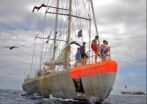(Press-News.org) The recent explosion in the number of retractions in scientific journals is just the tip of the iceberg and a symptom of a greater dysfunction that has been evolving the world of biomedical research say the editors-in-chief of two prominent journals in a presentation before a committee of the National Academy of Sciences (NAS) today.
"Incentives have evolved over the decades to encourage some behaviors that are detrimental to good science," says Ferric Fang, editor-in-chief of the journal Infection and Immunity, a publication of the American Society for Microbiology (ASM), who is speaking today at the meeting of the Committee of Science, Technology, and Law of the NAS along with Arturo Casadevall, editor-in -chief of mBio®, the ASM's online, open-access journal.
In the past decade the number of retraction notices for scientific journals has increased more than 10-fold while the number of journals articles published has only increased by 44%. While retractions still represent a very small percentage of the total, the increase is still disturbing because it undermines society's confidence in scientific results and on public policy decisions that are based on those results, says Casadevall. Some of the retractions are due to simple error but many are a result of misconduct including falsification of data and plagiarism.
More concerning, say the editors, is that this trend may be a symptom of a growing dysfunction in the biomedical sciences, one that needs to be addressed soon. At the heart of the problem is an economic incentive system fueling a hypercompetitive environment that is fostering poor scientific practices, including frank misconduct.
The root of the problem is a lack of sufficient resources to sustain the current enterprise. Too many researchers are competing for too little funding, creating a survival-of-the-fittest, winner-take-all environment where researchers increasingly feel pressure to publish, especially in high-prestige journals.
"The surest ticket to getting a grant or job is getting published in a high profile journal," says Fang. "This is an unhealthy belief that can lead a scientist to engage in sensationalism and sometimes even dishonest behavior to salvage their career."
Funding is just one aspect of a very complex problem Casadevall and Fang see growing in the biomedical sciences. In a series of editorials in the journal Infection and Immunity they describe their views in detail, arguing that science is not as healthy as it could be or as it needs to be to effectively address the challenges facing humanity in the 21st century.
"Incentives in the current system place scientists under tremendous stress, discourage cooperation, encourage poor scientific practices and deter new talent from entering the field," they write. "It is time for a discussion of how the scientific enterprise can be reformed to become more effective and robust."
The answers, they write, must come not only from within the scientific community but from society as a whole that has helped create the current incentive structure that is fostering the dysfunction. In the editorials they outline a series of recommended reforms including methodological, cultural and structural changes.
"In the end, it is not the number of high-impact-factor papers, prizes or grant dollars that matters most, but the joys of discovery and the innumerable contributions both large and small that one makes through contact with other scientists," they write. "Only science can provide solutions to many of the most urgent needs of contemporary society. A conversation on how to reform science should begin now."
###Copies of the Infection and Immunity editorials can be found online at
http://iai.asm.org/content/80/3/891.full
and
http://iai.asm.org/content/80/3/897.full
The American Society for Microbiology is the largest single life science society, composed of over 39,000 scientists and health professionals. ASM's mission is to advance the microbiological sciences as a vehicle for understanding life processes and to apply and communicate this knowledge for the improvement of health and environmental and economic well-being worldwide.
Has modern science become dysfunctional?
2012-03-27
ELSE PRESS RELEASES FROM THIS DATE:
Genetic causes found in nearly 1 in 5 patients with dilated cardiomyopathy heart failure
2012-03-27
MAYWOOD, Ill. -- Researchers have identified genetic causes in nearly 1 in 5 patients who suffer a type of heart failure called dilated cardiomyopathy.
Carolyn Jones, MD, PhD, of Loyola University Medical Center, is co-author of the study, published in the Journal of Cardiac Failure. First author is Neal Lakdawala, MD, of Brigham and Women's Hospital.
Researchers did genetic testing on 264 patients with dilated cardiomyopathy and found that 17.4 percent had gene mutations associated with the disease. Pediatric patients were more likely to have the mutations than older ...
Chemical microgradients accelerate coral death at the Great Barrier Reef
2012-03-27
This press release is available in German.
Researchers of the Max Planck Institute for Marine Microbiology along with Australian colleagues, have examined corals from the Great Barrier Reef affected by the Black Band Disease and identified the critical parameters that allow this prevalent disease to cause wide mortality of corals around the world. Corals infected with Black Band show a characteristic appearance of healthy tissue displaced by a dark front, the so called Black Band, which leaves the white limestone skeleton of the coral animal exposed. The dark front ...
WinADay Players on Facebook Choose 'Pet' Theme for New Slots Game
2012-03-27
WinADayCasino.com is consulting with players on Facebook in the development of its next one-of-a-kind online casino game. Fans of the online casino's Facebook page voted almost unanimously that the new game have a "house pet" theme. They've since been asked for their input on how many pay lines the slot game should have and all slots players are invited give their opinion this week on what kind of bonus features should be included. Previous and current polls and discussions are available at www.Facebook.com/WinADayCasino.
"We're in pretty close touch with ...
Smiling through the tears: Study shows how tearjerkers make people happier
2012-03-27
COLUMBUS, Ohio – People enjoy watching tragedy movies like "Titanic" because they deliver what may seem to be an unlikely benefit: tragedies actually make people happier in the short-term.
Researchers found that watching a tragedy movie caused people to think about their own close relationships, which in turn boosted their life happiness. The result was that what seems like a negative experience – watching a sad story – made people happier by bringing attention to some positive aspects in their own lives.
"Tragic stories often focus on themes of eternal love, and this ...
Air pollution from trucks and low-quality heating oil may explain childhood asthma hot spots
2012-03-27
Where a child lives can greatly affect his or her risk for asthma. According to a new study by scientists at Columbia University, neighborhood differences in rates of childhood asthma may be explained by varying levels of air pollution from trucks and residential heating oil. Results appear online in the Journal of Exposure Science and Environmental Epidemiology.
In New York City, where the study was conducted, asthma among school-age children ranges from a low of 3% to a high of 19% depending on the neighborhood, and even children growing up within walking distance of ...
Scientists suggest new age for East African Rift
2012-03-27
ATHENS, Ohio -- The Great Rift Valley of East Africa—the birthplace of the human species—may have taken much longer to develop than previously believed, according to a new study published this week in Nature Geoscience that was led by scientists from James Cook University and Ohio University.
The team's findings suggest that a major tectonic event occurred in East Africa as far back as 25-30 million years ago, rearranging the flow of large rivers such as the Congo and the Nile to create the unique landscapes and climates that mark Africa today.
"The findings have important ...
Upside Software Launches UpsideLive for Salesforce on Salesforce.com's AppExchange, the App Marketplace for the Social Enterprise
2012-03-27
Upside Software today announced it has launched UpsideLive for Salesforce on salesforce.com's AppExchange, helping to accelerate the market shift to the next cloud computing paradigm which is inherently social, mobile and open. UpsideLive for Salesforce allows customers to capitalize on leading technology and comprehensive contract management functionality through the power of the Force.com platform with no installation or integration required.
Built on Force.com, salesforce.com's social enterprise platform for building employee-facing apps, UpsideLive for Salesforce ...
Announcement: Nonfictionfoods.com.au Launch by Shivam Technologies
2012-03-27
Over the years, muesli has got a notorious reputation of being boring, plain, having no flavour etc. Non Fiction Foods has developed a muesli recipe which is super healthy and more importantly developed and endorsed by none other than a True Australian Hero, Jim Stynes.
About Non Fiction Foods
Jim Stynes developed Jimbo Super Muesli. He was diagnosed with cancer in 2009. With his typical single minded determination, he studied and adopted an anti-cancer diet. The adoption of life force foods (a property that causes things to move, reproduce itself and repair itself ...
TARA OCEANS completes 60,000-mile journey to map marine biodiversity
2012-03-27
HEIDELBERG -- The two-and-a-half-year TARA OCEANS expedition finishes on 31 March when the ship and crew reach Lorient, France. The arrival completes a journey of 60 000 miles across all the world's major oceans to sample and investigate microorganisms in the largest ecosystem on the planet, reports Eric Karsenti in an editorial published today in Molecular Systems Biology.
"Life and evolution started in the oceans, yet we know very little about the distribution of marine biodiversity," said Karsenti, senior scientist at the European Molecular Biology Laboratory in Heidelberg, ...
Parsing the Pill's impact on women's wage
2012-03-27
ANN ARBOR, Mich. -- Although women continue to lag behind men in pay, the gender wage gap has narrowed considerably since the 1960s. Now a new University of Michigan study is the first to quantify the impact of the pill on women's labor market advances.
The study shows that roughly one-third of women's wage gains through the 1990s are due to the availability of oral contraceptives.
Published online this week by the National Bureau of Economic Research as a working paper, the study was conducted by U-M economist Martha Bailey and colleagues Brad Hershbein at U-M and ...



